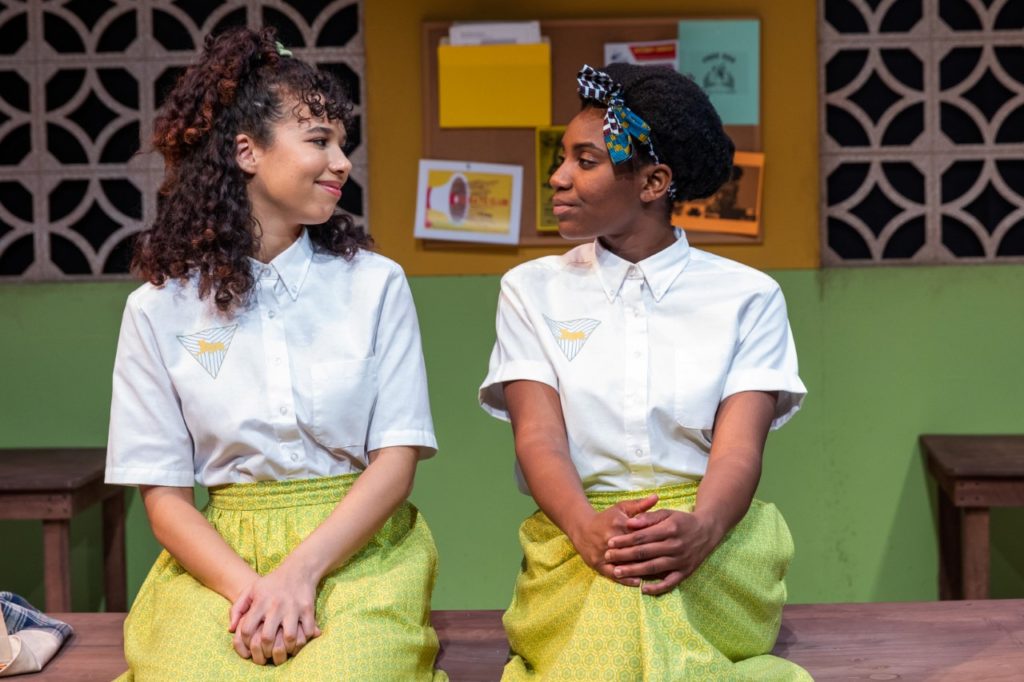School Girls; or the African Mean Girls Play: A Show about Competition

Jocelyn Bioh’s School Girls; Or, the African Mean Girls Play now appearing at Boston’s SpeakEasy tells a tale of a group of six adolescent girls in their at the Aburi Girls Boarding School in Ghana in the 1980s. A comical show at times, it is also disturbing since it is deals with colorism which differs from racism in that lighter skin is considered more attractive than dark even amongst some black people. As the show begins, the clever, strong-willed, and pretty Paulina Sarpong (Ireon Roach) who is 18 has appointed herself the leader of the other four girls, thus becoming the most popular girl in school. Her popularity rubs off on her followers who enjoy their status.
As is often common among adolescent girls, weight is a concern. Nana’s appetite causes Paulina and consequently the others to make fun of her. However, when Paulina leaves the room, the others girls apologize for their behavior to the not very bright 18 year old Nana (Shanelle Chloe Villegas). They obey Paulina since they do not want her to attack them.
There is a great deal of tension and excitement at the school because of a beauty pageant that is to take place. Paulina is convinced she will be chosen to represent Ghana. She informs them that her cousins in America will be sending her clothing to wear in the pageant. All the girls are fascinated by the U.S. although they know little about it. Paulina brags about “trendy American boutiques” such as Walmart and high class restaurants like White Castle, which she imagines as a palace.
Paulina’s plans fall apart when the Headmistress (Crystin Gilmore) introduces a new student to the girls. She is 18 year old Ericka Boafo (Victoria Byrd), different from the other characters in that she is light-skinned, has long hair, and has arrived from the United States. Paulina tries to maintain her position by discussing her American relatives. When Ericka asks where they are located, Paulina is unable to answer. Ericka lived in Ohio, a state unknown to the students. Her father who resides not far from the school owns a cocoa processing factory.
Ericka has signed up to try out for the Ghana contestant in the beauty pageant since she naïvely thinks it will be an enjoyable way meet friends. Paulina feels threatened and forces Nana to break into the Headmistress’s files in the hope of finding information about Ericka that will embarrass her and ruin her chances of competing in the pageant.
While the Headmistress is sitting in the cafeteria going over paperwork, Eloise Amponsah (Kris Sidberry), the first and only Miss Ghana enters. She is still very attractive and has become a recruiter for the Miss Ghana Pageant. The financial reward she will receive if she chooses a winner is her incentive. On the way in, she spotted Ericka and decided that with her brown hair and fair skin, she had a good chance of becoming Miss Ghana and then competing in the world pageant. She enlists the help of the Headmistress by explaining the benefits the school will gain if Ericka wins the contest.
Paulina and Ericka quarrel and Ericka reveals her unhappy life in the U.S. where she had no friends because there were no black students at her school and the white kids ignored her. She only returned to Ghana because her white mother died. Her father brought her back, put her in school, and ignores her. Paulina has had a difficult life as well. Her mother had eight children, most of them with different fathers. Because her skin was very dark her mother bought her bleaching cream which often replaced food and told her “it would serve her better in life.”
Ericka becomes Miss Ghana and enters the Miss Global Universe Pageant in Orlando, Florida. Her classmates and the Headmistress watch it on television rooting for Ericka until the end. The ten finalists are all white.
School Girls is well acted and directed. Several of the cast members playing the students are still studying theatre at school or have recently graduated. Their interaction with each other is believable and takes the audience back to their own high school experiences.
School Girls; Or, The African Mean Girls Play, through May 25 at SpeakEasy Stage, 527 Tremont Street, Boston, MA.
Playwright Jocelyn Bioh
Director Summer L. Williams
Scenic Design Baron E. Pugh
Costume Design Miranda Kau Giurleo
Lighting Design Devorah Kengmana
Sound Design Allyssa Jones
Actors
Geraldine Bogard, Victoria Byrd, Crystin Gilmore, Ireon Roach, Kris Sidberry, Temmeh Sillah,
Sabrina Victor, Shanelle Chloe Villeglas